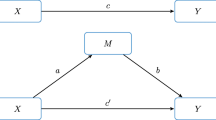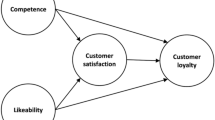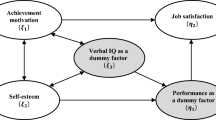Abstract
This paper provides two groups of conditions of model consistency in least-absolute-deviation mediation models. Under model consistency, we establish the asymptotic theory of the difference estimator and the product estimator, and show that the two estimators are not only numerically nonequivalent but asymptotically nonequivalent, which is dramatically different from the situation in the least squares mediation analysis where these two estimators are numerically equivalent. In all three possible scenarios of model parameters, both the asymptotic theories and simulation studies show that the product estimator is more efficient than the difference estimator.




Similar content being viewed by others
References
Angrist J, Chernozhukov V, Fernández-Val I (2006) Quantile regression under misspecification, with an application to the U.S. wage structure. Econometrica 74:539–563
Baron RM, Kenny DA (1986) The moderator–mediator variable distinction in social psychological research: conceptual, strategic, and statistical considerations. J Person Soc Psychol 51:1173–1182
Bind M-A, VanderWeele TJ, Schwartz JD, Coull BA (2017) Quantile causal mediation analysis allowing longitudinal data. Stat Med 36:4182–4195
Field AP, Wilcox RR (2017) Robust statistical methods: a primer for clinical psychology and experimental psychopathology researchers. Behav Res Therapy 98:19–38
Hayes AF (2018) Introduction to mediation, moderation, and conditional process analysis: a regression-based approach, 2nd edn. Guilford Press, New York
Hox JJ (2002) Multilevel analysis: techniques and applications. Erlbau, Mahwah
Huber PJ, Ronchetti EM (2009) Robust statistics, 2nd edn. Wiley, New York
Knight K (1998) Limiting distributions for \({L}_{1}\) regression estimators under general conditions. Ann Stat 26:755–770
Koenker R (2005) Quantile regression. Cambridge University Press, New York
Lindquist MA (2012) Functional causal mediation analysis with an application to brain connectivity. J Am Stat Assoc 107:1297–1309
MacKinnon DP (2008) Introduction to statistical mediation analysis. New York
MacKinnon DP, Lockwood CM, Hoffman JM, West SG, Sheets V (2002) A comparison of methods to test mediation and other intervening variable effects. Psychol Methods 7:83–104
MacKinnon DP, Warsi G, Dwyer JH (1995) A simulation study of mediated effect measures. Multivar Behav Res 30:41–62
Micceri T (1989) The unicorn, the normal curve, and other improbable creatures. Psychol Bull 105:156–166
Pearl J (1995) Causal diagrams for empirical research. Biometrika 82:669–710
Pearl J (2009) Causality: models, reasoning, and inference, 2nd edn. Cambridge University Press, New York
Pollard D (1991) Asymptotics for least absolute deviation regression estimators. Econom Theory 7:186–199
Preacher KJ (2015) Advances in mediation analysis: a survey and synthesis of new developments. Annu Rev Psychol 66:825–852
Preacher KJ, Zyphur MJ, Zhang Z (2010) A general multilevel SEM framework for assessing multilevel mediation. Psychol Methods 15:209–233
Shen E, Chou C-P, Pentz MA, Berhane K (2014) Quantile mediation models: a comparison of methods for assessing mediation across the outcome distribution. Multivar Behav Res 49:471–485
VanderWeele TJ (2015) Explanation in causal inference: methods for mediation and interaction. Oxford University Press, Oxford
VanderWeele TJ, Hong GL, Jones SM, Brown JL (2013) Mediation and spillover effects in group-randomized trials: a case study of the 4Rs educational intervention. J Am Stat Assoc 108:469–482
VanderWeele TJ, Vansteelandt S (2014) Mediation analysis with multiple mediators. Epidemiol Methods 2:95–115
Wang WW, Yu P, Lin L, Tong T (2019) Robust estimation of derivatives using locally weighted least absolute deviation regression. J Mach Learn Res 60:1–49
Wang WW, Yu P, Zhou Y, Tong T, Liu Z (2021) Equivalence of two least-squares estimators for indirect effects. Current Psychol 1–12
Wilcox RR (2017) Introduction to robust estimation & hypothesis testing, 4th edn. Elsevier, Amsterdam
Yuan Y, MacKinnon DP (2014) Robust mediation analysis based on median regression. Psychol Methods 19(1):1–20
Zhao Z, Xiao Z (2014) Efficient regression via optimally combining quantile information. Econom Theory 30:1272–1314
Zu J, Yuan K-H (2010) Local influence and robust procedures for mediation analysis. Multivar Behav Res 45:1–44
Acknowledgements
We thank Professor Keith Knight for providing us his papers on second-order asymptotics of quantile regression. WenWu Wang was supported by National Natural Science Foundation of China (No. 12071248) and National Statistical Science Research Foundation of China (No. 2020LZ26). Yu acknowledges support from the GRF of Hong Kong Government under Grant No. 106200228.
Author information
Authors and Affiliations
Corresponding author
Additional information
Publisher's Note
Springer Nature remains neutral with regard to jurisdictional claims in published maps and institutional affiliations.
Supplementary Information
Below is the link to the electronic supplementary material.
Rights and permissions
Springer Nature or its licensor (e.g. a society or other partner) holds exclusive rights to this article under a publishing agreement with the author(s) or other rightsholder(s); author self-archiving of the accepted manuscript version of this article is solely governed by the terms of such publishing agreement and applicable law.
About this article
Cite this article
Wang, W., Yu, P. Nonequivalence of two least-absolute-deviation estimators for mediation effects. TEST 32, 370–387 (2023). https://doi.org/10.1007/s11749-022-00837-8
Received:
Accepted:
Published:
Issue Date:
DOI: https://doi.org/10.1007/s11749-022-00837-8




